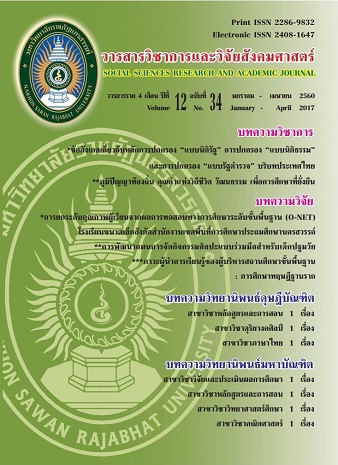ภาวะผู้นำการเรียนรู้ของผู้บริหารสถานศึกษาขั้นพื้นฐาน: การศึกษาทฤษฎีฐานราก; Learning Leadership of School Principals: A Grounded Theory Study
Main Article Content
Abstract
บทคัดย่อ
วัตถุประสงค์ของการวิจัยนี้เพื่อศึกษา 1) ลักษณะและองค์ประกอบของภาวะผู้นำการเรียนรู้ 2) เงื่อนไข
เชิงสาเหตุการแสดงออกภาวะผู้นำการเรียนรู้ 3) การปฏิบัติและปัจจัยที่ส่งผลต่อการปฏิบัติภาวะผู้นำการเรียนรู้ และ
4) ผลสืบเนื่อง (consequence) จากการมีภาวะผู้นำการเรียนรู้นำไปสู่ข้อสรุปเชิงทฤษฎี การเก็บรวบรวมข้อมูลใช้วิธี
การ การสัมภาษณ์เชิงลึก การสังเกต แบบมีส่วนร่วม การสนทนากลุ่มแบบเจาะจง พื้นที่ในการศึกษาประกอบด้วย โรงเรียนประถมศึกษา และมัธยมศึกษารวม 6 แห่งที่มีผู้บริหารที่ได้รับการยอมรับว่ามีภาวะผู้นำสูงและโดดเด่น ผู้ให้ข้อมูลประกอบด้วย ผู้บริหารโรงเรียน คณะกรรมการบริหารฝ่ายต่างๆ หัวหน้ากลุ่มสาระการเรียนรู้ ครู คณะกรรมการสถานศึกษา ผู้ปกครอง ศึกษานิเทศก์และคณะผู้มาศึกษาดูงานโรงเรียนดังกล่าว
ผลวิจัย พบว่า
1. คุณลักษณะภาวะผู้นำการเรียนรู้ ประกอบด้วย (1) ความคิดสร้างสรรค์และความกล้า (2) การสร้างสภาพแวดล้อมที่ทรงพลังเอื้อต่อการเรียนรู้และการเกิดนวัตกรรม (3) ความยืดหยุ่น (4) การบูรณาการ ของศาสตร์และเทคนิควิธี (5) เทคโนโลยีในการบริหารจัดการและการเรียนรู้ (6) การเรียนรู้เป็นทีม (7) การเรียนรู้ด้วยการนำตนเอง (8) การเปลี่ยนแปลงและมีความเฉพาะตัว (tailor made) (9) ความพอเพียง (10) การวิจัยและพัฒนา
2. เงื่อนไขเชิงสาเหตุของการเกิดภาวะผู้นำการเรียนรู้ ได้แก่ (1) ภูมิหลังส่วนบุคคล แรงบันดาลใจ การเป็นผู้สร้างองค์ความรู้และเป็นผู้ชอบคิดต่างรวมทั้งการสร้างนวัตกรรม แรงขับของสังคม (ภาวะวิกฤติทางการศึกษา ทักษะความรู้ในศตวรรษที่ 21 และความคาดหวังจากนโยบายเบื้องบน) (2) เงื่อนไขเชิงบริบท (3) เงื่อนไขสอดแทรก
(วัฒนธรรมการเรียนรู้นโยบาย ICT เพื่อการศึกษาและการบริหารโดยใช้โรงเรียนเป็นฐาน)
3. การปฏิบัติการของภาวะผู้นำการเรียนรู้ ได้แก่ (1) การสร้างวิสัยทัศน์ร่วมและมุ่งเน้นการเรียนรู้ (2) การค้นหาปัจจัยที่ทำให้เป้าประสงค์สำเร็จ (3) การพัฒนาความสัมพันธ์กับบุคคลทั้งภายในและภายนอกโรงเรียน และความไว้วางใจ (4) การคิดหาวิธีการและกลยุทธ์ (5) การออกแบบการเรียนรู้ในลักษณะ backward mapping (6) การสร้าง
เครือข่ายพันธมิตรให้เพิ่มขึ้น (7) การสร้างอัตลักษณ์และแนวปฏิบัติที่ดี (8) การนำเอาค่านิยมที่ดีมาใช้ (9) การเปลี่ยนห้องสมุดมาเป็นศูนย์เรียนรู้ และ (10) วิจัยและพัฒนา
4. ผลสืบเนื่องจากการมีภาวะผุ้นำการเรียนรู้ทั้งต่อตนเองทำให้เกิดประสิทธิภาพการบริหารจัดการ ประสิทธิภาพการจัดการเรียนรู้ของครู และส่งผลต่อคุณภาพการศึกษา รวมทั้งการสร้างองค์ความรู้ใหม่ทางวิชาการและวิชาชีพ
Abstract
The purpose of this research was to study and construct a grounded theory of learning leadership, they were: 1) characteristics or attributes of learning leadership, 2) causal conditions leading to being a leader, 3) actions and factors affecting the learning leadership, and 4) the consequences of learning leadership. The conclusion drawn from the phenomenal study led to theoretical conclusion. Data collection was performed using various methods including in-depth interview, participant observation, and focus group discussion. The study sites included 6 schools. Informants consisted of school principals, management committees for different sections, heads of subject groups, teachers, school committees, parents, educational supervisors, and study trip groups to the schools.
The research findings are as follows:
1. Characteristics/attributes: (1) creativity and courage, (2) construction of the powerful learning environment, (3) flexibility, (4) integration, (5) technologies for learning and management, (6) team learning, (7) self-directed learning, (8) transformational process and tailor-making, (9) economic sufficiency, (10) research and development.
2. Causal condition behind learning leadership: (1) background, inspiration, construction of knowledge, high order thinking, innovation and social drive (educational crisis, the 21st Century skills); (2) contextual conditions; (3) intervention (knowledge and understanding of learning, learning culture, school-based management and ICT policy).
3. Actions of learning leadership: (1) shared vision, (2) finding of factors affecting learning achievement, (3) creation and development of relationships with people and community, and building of trust, (4) finding mission and strategies, (5) designing learning school model based on backward mapping, (6) building the networks,
(7) creation of identity and good practice, (8) application of values that lead to be success, (9) turning library to be
a learning center, and (10) conduct research and development.
4. The consequences occur in the form of efficiency in management and instruction of teachers which lead to educational qualities while new models of knowledge are created academically and professionally.


